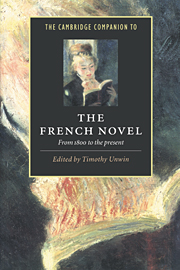Book contents
- Frontmatter
- 1 On the novel and the writing of literary history
- 2 Novels of testimony and the 'invention' of the modern French novel
- 3 Reality and its representation in the nineteenth-century novel
- 4 Women and fiction in the nineteenth century
- 5 Popular fiction in the nineteenth century
- 6 Decadence and the fin-de-siècle novel
- 7 The Proustian revolution
- 8 Formal experiment and innovation
- 9 Existentialism, engagement, ideology
- 10 War and the Holocaust
- 11 From serious to popular fiction
- 12 The colonial and postcolonial Francophone novel
- 13 The French-Canadian novel
- 14 Gender and sexual identity in the modern French novel
- 15 Postmodern Frenchfiction
- General bibliography
- Index
15 - Postmodern Frenchfiction
Published online by Cambridge University Press: 28 May 2006
- Frontmatter
- 1 On the novel and the writing of literary history
- 2 Novels of testimony and the 'invention' of the modern French novel
- 3 Reality and its representation in the nineteenth-century novel
- 4 Women and fiction in the nineteenth century
- 5 Popular fiction in the nineteenth century
- 6 Decadence and the fin-de-siècle novel
- 7 The Proustian revolution
- 8 Formal experiment and innovation
- 9 Existentialism, engagement, ideology
- 10 War and the Holocaust
- 11 From serious to popular fiction
- 12 The colonial and postcolonial Francophone novel
- 13 The French-Canadian novel
- 14 Gender and sexual identity in the modern French novel
- 15 Postmodern Frenchfiction
- General bibliography
- Index
Summary
As several contributors to this volume have indicated, the modern French novel has shown a particularly strong capacity for questioning and redefining itself. This dynamic of constant self-renewal expresses the broader vitality of modernism at large, understood as a general ethos informing a variety of artistic movements since the 1880s, all bent on expanding, and in some cases exploding, a space of representation deemed to be unduly monopolised by codes inherited from the past. In the modern novel, as in the visual arts, the main codes under attack are those sustained by the orthodoxy of classical nineteenth-century realism, with the attack itself often being justified in the name of a 'higher' form of the same basic mimetic urge, such as 'psychological' realism, which prioritises the inner world of human subjectivity, or 'phenomenological' realism, which tracks the outer world as physically experienced by a human subject. Modernism, then, is characterised by a strongly felt need to effect a break with the past, which in turn generates a search, often conducted in an experimental spirit, for new forms and modes of artistic expression. In the twentieth century, this modernist logic of rupture and renewal, central to the very concept of an 'avant-garde', provides the framework within which most theorising about the novel has taken place.
- Type
- Chapter
- Information
- The Cambridge Companion to the French NovelFrom 1800 to the Present, pp. 242 - 260Publisher: Cambridge University PressPrint publication year: 1997
- 2
- Cited by



